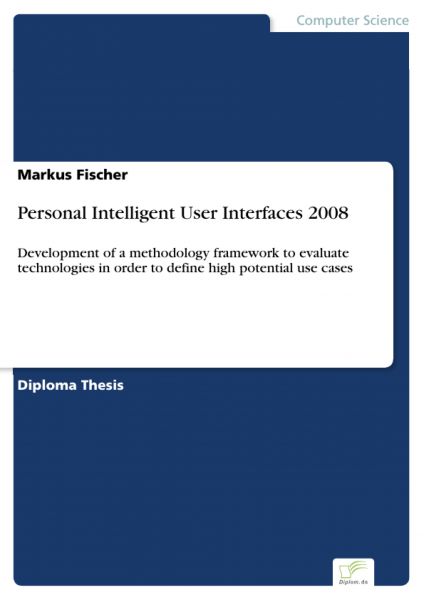Personal Intelligent User Interfaces 2008
Development of a methodology framework to evaluate technologies in order to define high potential use cases
Inhaltsangabe:Abstract:
The evolution of computing and communication is on the fast track - its impact on work and life style is immense and carries with it vast social and economical implications for both individuals and enterprises. Advances in wireless and broadband technologies and trends such as pervasive networks, fixed-mobile convergence, seamless communication and sensor networks will have a broader impact and an even more profound influence on the way we live than the personal computer, PDA, cellular phone and Internet had from 1995-2005.
„Always on” and „ubiquity”, the credos of today's ICT market, have already become customer demands. Under constrain to satisfy these demands, generate new service revenues, and retain higher percentages of existing customers worldwide, operating telecommunication companies have to break new ground. Personalization is considered a key differentiator in the increasingly competitive landscape. With the increasing proliferation of service types and features, a personal intelligent user interface will enable higher customer utility and also make new service scenarios possible.
The main problem areas discussed in this thesis are technology forecast and usability evaluation of a new technology. Two well known quotations as follows will introduce the problem of technology forecasting. „This 'telephone' has too many shortcomings to be seriously considered as a means of communication. The device is inherently of no value to us.” A more contemporary the following statement by William Gates III from 1981: „640Kbyte ought to be enough for anybody.” These statements might cause amazement, especially considering the fact that both companies are still in business.
Admittedly, as the telephone replaced the telegraph, money transfer became the Western Union Telegraph Company's primary line of business. However, this begs the question how such companies were even capable of surviving such major misjudgements regarding their strategic technology alignment. Generally speaking, the only possible strategies were changing the focus of their business (as was the case with Western Union), simply „getting lucky” or, alternatively, having enough money to assimilate the missing technology through purchases.
But it can’t be the goal of a global player to miss or loose millions and, in the case of a small firm, to go out of business simply because the chief executive or the person in charge misdiagnosed strategic technology […]
Inhaltsangabe:Abstract:
The evolution of computing and communication is on the fast track - its impact on work and life style is immense and carries with it vast social and economical implications for both individuals and enterprises. Advances in wireless and broadband technologies and trends such as pervasive networks, fixed-mobile ...
Versandkostenfreie Lieferung! (eBook-Download)
Als Sofort-Download verfügbar
- Artikel-Nr.: SW9783956360701
- Artikelnummer SW9783956360701
-
Autor
Markus Fischer
- Verlag Diplom.de
- Seitenzahl 126
- Veröffentlichung 26.03.2007
- ISBN 9783956360701
- Verlag Diplom.de

